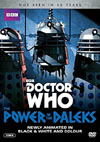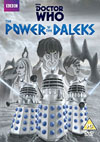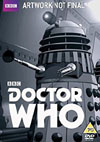2-disc DVD Features include:
"The Power of the Daleks" had the greatest burden in selling the concept of regeneration, as no viewer had any knowledge of it yet. To this end, the final scenes of "The Tenth Planet" (the previous story) ought to be repeated in their entirety, beginning with the Doctor moving from Antarctic police box exterior to console room interior to demonstrate the essentials of the TARDIS. Thankfully, the new animated version you can buy on DVD makes a good attempt at some of this, but all was not so smooth on the original episodes. There, all we got was some weird "re-shoot" of the regeneration effect, which probably did not involve William Hartnell, and if the telesnaps at the end of Jeremy Bentham's "Doctor Who: The Early Years" are any indication, the "up-the-nose" camera angle is less than ideal. There is far too much empty silence in the opening scenes of this story, and the lack of straight answers from the new Doctor is poorly motivated, not helping his situation or his companions, and doing little to sell regeneration, or the series as a whole, to the audience either. Time enough to drop in Hartnell's last scene, and a proper materialization for the TARDIS on Vulcan - these are crucially important missing elements. At least the film of the TARDIS materializing in the Antarctic was reportedly reversed on the original episodes to show our travellers leaving, and in sync with the right sound. However, landings are always more dramatically important and heroic than take-offs, as the Doctor Who production crew had yet to discover.
Mistaken identity is the order of the day in these first episodes. Ben and Polly argue over whether the Patrick-Troughton-figure before them really is the Doctor, and his needlessly enigmatic answers fuel Ben's harsh disbelief. If that isn't enough, an official "Examiner" from Earth has been secretly murdered by an unknown villain, and upon discovering the body and credentials, the Doctor proceeds to impersonate him. Why? Who only knows. I guess it seemed like a fun thing to do at the time. The Doctor could have maintained much higher integrity throughout the adventure had he gone in being himself, but maybe he's not really sure himself Who he is at the moment.
The Saward TouchWriting Tom Baker's narration for the audio cassette version of this story is early 1980's script editor Eric Saward, who does not fail to leave his stylish mark on the story. In his version, there seems to be much emphasis on pain, callous lack of caring, and violent carnage. This time around, Whitaker's story seems to be typical of the type Saward liked to write himself - full of unlikeable, unsympathetic pathetic characters who you can't wait to see exterminated just to be done and rid of them. Not my cup of tea, but Saward's passive-aggressive touch seems to be well-matched for this particular original story.
There's Something About Janley...The Vulcan colonist guest characters themselves are not much more than a bland bunch of morons. None of them have a future, not even the few that survive the adventure. Most are self-centered and petty, and their hidden motivations are disappointing once revealed. Janley appears to be the only female character that has any significant amount of screen time, and a bit too much plot seems to revolve around other characters having a "thing" for her, hidden or not. The film "There's Something About Mary" is an example of how to make this kind of angle very entertaining; "The Power of the Daleks" is a warning of how boring you can make it if none of your characters have any true entertainment value going for them in the first place.However, as we graduate from audio-only versions of this story to look at animated and telesnap versions, several of the colonist guest-characters begin to pop out much better. In particular, Bernard Archard, who had also played Marcus Scarman in "Pyramids of Mars" (story no. 82), suddenly seems much better at owning the role of Bragen in this story. Also, Peter Bathurst, who had also played the humorous bureaucrat Mr. Chinn in "The Claws of Axos" (story no. 57) is far easier to recognize and enjoy as he tackles the role of the colony's Governor Hensell here in this story. Indeed, simply being able to see who says what turns out to make everything far more clear and enjoyable, though sadly, these characters still aren't truly great ones.
You know, it's a bizarre thing that with most continuing animated series, whether it's Scooby Doo, or Inspector Gadget, or Futurama, or The Simpsons, there exists a sort of bible template for the way in which each character should be drawn, so that they consistently look the same from one episode to the next. But as we now get animated versions of all these lost Doctor Who stories coming from so many varied animation companies, we end up with a set of "regular" characters that look wildly different from one story to the next. It requires that we continually update the ideas in our heads about what each character should look like, in animated form. Do we get so attached to any one version that it prejudices us against whatever the next company might do? Hmmm. The animators do a fair job with Patrick Troughton in this adventure, given that it's his first story and he hasn't quite found many of his most iconic traits yet. But to me, Ben's face just isn't round enough here - he looks a bit too long and gaunt. They did manage to capture Bernard Archard's likeness close enough though, which I really did appreciate. Additionally, one may wonder how it was possible to squeeze the black and white 6 half hour animated episodes and the 6 half hour telesnap episodes all onto disc 2 of the DVD set, along with all the other bonus featurettes. Well, it seems the telesnap episodes are very, very highly compressed - to the degree that any full motion would not work very well. It's okay for any still image, but even the odd fade in from black or out to black breaks up into distracting mosaic patterns. As such, you won't find properly moving title graphics here, or any of the full motion clips properly incorporated. But the telesnaps remain a nice way of watching the story which reveals what the original acting would have looked like.
By episode five, things are really moving..... or are they? The Doctor has a fine escape scene, after which he sneaks about for a bit to check up on the Daleks. Yes, their devious plan is progressing horrifically. We the audience are just as morbidly interested, following the Doctor's cue. Then he gets recaptured and stuffed back into his cell. End of episode, as far as the Doctor is concerned. Well done holiday absences for Ben and Polly, tied into the developments amongst the colonists and the rebels, all help keep things interesting, although the colonists' angles prove severely disappointing next episode. The Doctor finally wakes up and smells the Dalekanium in the final episode, taking action to stop the Daleks and their plans. Nice last minute finish to wrap things up - the Doctor finally appears to be the commanding hero, as all his friends and acquaintances gather to praise him for saving the colony.
International Titles:Deutsch (German): (Die Macht der Daleks)Magyar (Hungarian): "A dalekek hatalma"Français (French): (Le Pouvoir des Daleks)Русский (Russian): "Энергия далеков""The Power of the Daleks" is not known to exist in its original format (6 black-and-white 25-minute TV episodes) in its entirety.
An entirely animated version,
synchronized to the original audio from the TV episodes,
Comments on this article are welcome. You may contact the author from this page:
|












